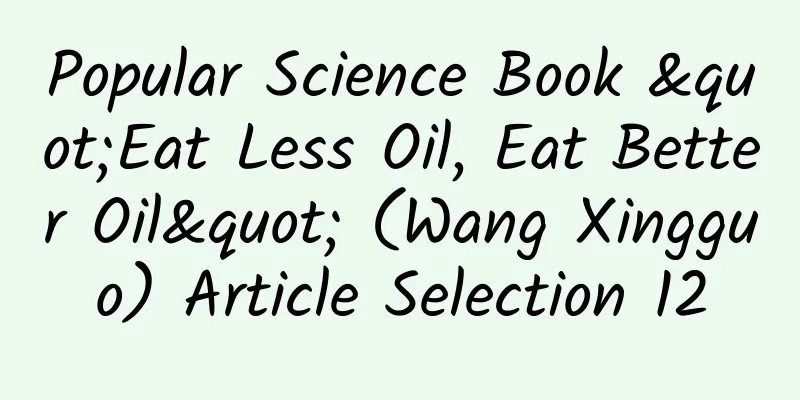Popular Science Book "Eat Less Oil, Eat Better Oil" (Wang Xingguo) Article Selection 12

|
2 The purpose of eating oil Oils and fats are nutrients composed of neutral fats (triglycerides) and lipids, and have many important nutritional and physiological functions for the human body. (1) Providing energy Three nutrients in food are responsible for providing energy to the human body, namely carbohydrates, fats and proteins. Fat is the most efficient. One gram of fat can produce about 37.6 kilojoules (9 kilocalories) of energy when oxidized in the body, which is 2.25 times the same mass of protein or carbohydrates. Under normal circumstances, 15%-30% of the energy needed by the human body every day comes from dietary fat. If the human body lacks dietary fat for a long time, it will lead to physical weakness, weight loss and even loss of mobility. Infants and young children eat more oil per kilogram of body weight than adults. (2) Composition of body fat Part of the fat we eat is used to provide energy for the human body. If there is any excess, it is stored in the human body for emergency use. This type of stored fat is referred to as body fat. The body fat of normal men accounts for 10% to 20% of their body weight, and that of women is 15% to 25%. When the body needs it, body fat can be mobilized and oxidized to provide energy for the body. Fat people are more resistant to hunger than thin people because the former store more fat. Body fat is mainly distributed under the skin and around the internal organs. In addition to providing energy, it also acts as a heat insulator and protective pad. It is worth mentioning that body fat is also an important endocrine tissue that can secrete various cytokines and participate in various physiological processes of the body, such as metabolism, immunity, growth and development. (3) Provide essential fatty acids Essential fatty acids are fatty acids that cannot be synthesized by the human body and must be provided by food, including linoleic acid and α-linolenic acid. They are components of cells and tissues, and have the functions of maintaining the integrity of skin, mucous membranes and capillaries, participating in the synthesis of prostaglandins and promoting cholesterol metabolism. If the diet lacks essential fatty acids for a long time, it will cause great harm to health. (4) Promote the absorption of fat-soluble vitamins Vitamin A, vitamin D, vitamin E, vitamin K and carotene (provitamin A) are not soluble in water and can only be dissolved in fats, so they are called fat-soluble vitamins. When they are dissolved in fats, they are easily absorbed and used by the human body. If there is a lack of fat in the food, even if you eat these vitamins, it is difficult for the body to absorb and use them. (5) Increase appetite and satiety On the one hand, oils and fats give food good color, aroma, taste and shape, thus increasing appetite. On the other hand, when oils and fats enter the duodenum from the stomach, they can stimulate the production of enterogastrone, which inhibits intestinal peristalsis, prolongs the time that food stays in the stomach, and increases satiety, thereby providing the human body with a long and stable energy supply together with carbohydrates and proteins, preventing premature hunger. Therefore, there is no need to deliberately restrict foods rich in oils and fats. Eating them in moderation can sometimes reduce the intake of food and total energy. The above are basically the functions of neutral fats. In addition to the main component of neutral fat, natural oils and fats also contain lipids that are also important for health, including fat-soluble vitamins, phospholipids, glycolipids, sterols, polyphenols, etc. The main function of phospholipids, glycolipids, and sterols is to serve as the basic components of cell membranes, accounting for about 50% of the weight of cell membranes; some lipids have messenger functions, and some can form hormones, which have special physiological effects in the body. Of course, dietary fat is not equal to human fat, but human fat is undoubtedly deeply affected by it. Among them, lipids are relatively stable in body fat and are less affected by diet, while neutral fat is more susceptible to dietary effects. |
<<: Popular Science Book "Eat Less Oil, Eat Better Oil" (Wang Xingguo) Article Selection 11
>>: Super detailed! All the frequently asked questions of tuberculosis patients are answered here
Recommend
Causes of 1st degree cervical erosion
I believe everyone is familiar with the disease o...
What does 100 contractions mean?
Uterine contraction of 100 usually means that the...
How many days is the menstrual cycle?
Menstruation is a relative of female friends. Fem...
What to do if Helicobacter pylori is positive during physical examination
Author: Hou Jiayi, Deputy Chief Technician, Shanx...
What are the preventive measures for cervical HPV virus?
HPV virus is a virus that people are relatively f...
Can I eat broiler chicken during menstruation?
Chicken is one of the most commonly eaten meats. ...
Symptoms and pictures of abnormal leucorrhea
Women may suffer from many gynecological diseases...
Can pregnant women eat loquat in the early stage?
Can I eat loquats during early pregnancy? You can...
Why are my labia getting bigger?
If you observe closely some married women, you wi...
Purple potato cakes should be made with flour or glutinous rice flour. What kind of flour should be used to make purple potato cakes delicious?
As we all know, purple sweet potato is a common f...
Effects of drinking soda before pregnancy
Pregnancy is a relatively long process that requi...
Red hard bumps on vulva
The private parts are an important part of the fe...
What is the grading of breast masses?
Breasts are extremely important to women. They ar...
Can I get pregnant if I have sex after an abortion?
Some female friends who do not want children but ...









